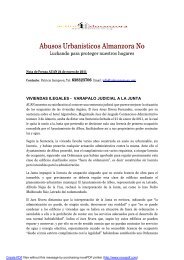European Property Rights and Wrongs - Diana Wallis MEP
European Property Rights and Wrongs - Diana Wallis MEP
European Property Rights and Wrongs - Diana Wallis MEP
Create successful ePaper yourself
Turn your PDF publications into a flip-book with our unique Google optimized e-Paper software.
veyancing experts fear that buyers <strong>and</strong> sellers may not be adequately informed<br />
about, e.g., public law limitations.<br />
Pension rights<br />
As a result of the financial crisis, banks, pension funds <strong>and</strong> even Member States<br />
have come in grave problems. Pension funds (as is now happening in the<br />
Netherl<strong>and</strong>s) inform their clients that they no longer can guarantee that rights,<br />
which have been built up in the past by paying premiums, will be effective upon<br />
reaching the retirement age <strong>and</strong> that pensions even may have to be cut. In as far as<br />
these measures are the outcome of austerity measures agreed upon at an EU level,<br />
EU citizens may invoke the EU Charter, referring not only to article 17 (protecting<br />
ownership, quoted above), but also article 25, protecting the rights of the elderly:<br />
“The Union recognises <strong>and</strong> respects the rights of the elderly to lead a life of dignity<br />
<strong>and</strong> independence <strong>and</strong> to participate in social <strong>and</strong> cultural life.” From decisions by<br />
the <strong>European</strong> Court of Human <strong>Rights</strong> it becomes clear that participants in pension<br />
schemes may not expect that this system will never change. However, participants<br />
in pension funds who paid individual premiums for their own private benefit do<br />
have a legitimate <strong>and</strong> protected expectation. In my view, when their rights are<br />
affected by EU imposed austerity measures they are not only protected by the<br />
<strong>European</strong> Convention, but also by the <strong>European</strong> Charter. This is even more the<br />
case, when taking into account article 25 of the Charter. How can elderly people<br />
lead a life of dignity <strong>and</strong> independence when their pensions are cut <strong>and</strong> how can<br />
they still then participate in social <strong>and</strong> cultural life?<br />
Whether pensions (or social security benefits) are protected “property” or<br />
not is rapidly becoming a question that crosses the borderline of law <strong>and</strong> politics<br />
<strong>and</strong> turns into a purely political question, given the impact on national budgets<br />
<strong>and</strong> decisions of pension funds, affecting large parts of the population. If that<br />
happens, protection of the right to property becomes of even greater importance.<br />
Fundamental human rights, as the right to property, do not stop where economic<br />
crisis <strong>and</strong> austerity measures begin. It is precisely in times of crisis that<br />
these rights must be effective, respected <strong>and</strong> protected by all involved, especially,<br />
in final instance, courts.<br />
48<br />
A <strong>European</strong> L<strong>and</strong> Law?



